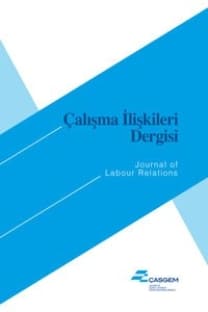Türkiye’de Toplumsal Kültürün İş Güvenliği Kültürüne Etkisi
İlgili literatür incelendiğinde iş güvenliği konusunda kültürel boyutun genellikle ihmal edildiği görülmektedir. İş güvenliği ile ilgili mevcut sorunların, genellikle ortaya çıkan zararın ve mağduriyetin tazmini şeklindeki yasal önlemlerle çözülmeye çalışıldığı gözlenmektedir. Oysa iş güvenliği sadece yasal boyutuyla değil, aynı zamanda toplumsal kültürle olan ilişkisi boyutuyla da ele alınmalıdır. Örgüt kültürünün toplumsal kültürün iş güvenliği kültürünün de örgütsel kültürün bir parçası olduğu açıktır. Bu nedenle iş güvenliği kültürü üzerinde toplumsal kültürün etkisi oldukça baskındır. Bu çalışmada Türkiye’de toplumsal kültürün iş güvenliği kültürü üzerindeki etkileri analiz edilmektedir. Bu amaç doğrultusunda Türkiye’de iş güvenliği kültürü; Hofstede’in kültürel boyutlar teorisi, kadercilik ve dış kontrol inancı, “bize bir şey olmaz” inancı ve aşırı güven duygusu ile korku kültürü bakış açılarından incelenmektedir. Yapılan analiz sonucunda Türkiye’de toplumsal kültürün iş güvenliği kültürünü genellikle olumsuz olarak etkilediği saptanmıştır. Bu kapsamda, iş güvenliği kültürünün oluşturulması süreci için bazı öneriler geliştirilmiştir.
Anahtar Kelimeler:
İş Güvenliği Kültürü, Hofstede’in Kültürel Boyutlar Teorisi, Kadercilik ve Dış Kontrol İnancı, Aşırı Güven Duygusu, Korku Kültürü
The Impact of Social Culture on Occupational Safety Culture in Turkey
When examining the relevant literature, it is seemed that the cultural dimension of occupational safety issues is usually neglected. It is observed that the existing problems related to occupational safety are usually tried to be solved by legal measures in the form of compensating the damage caused and the suffering. However, occupational safety is mainly a cultural problem which is in relations with the social culture. Organizational culture is a part of the social culture, and occupational safety culture is a part of the organizational culture. Therefore, the impact of social culture on occupational safety culture is quite dominant. This study analyzes the impact of social culture on occupational safety culture in Turkey. In accordance with this purpose; occupational safety culture in Turkey is analyzed with the aspects of Hofstede’s cultural dimensions theory, fatalism and external control belief, “nothing will happen to us, we will sail through” belief, overconfidence and fear culture. The results showed that the social culture generally affects occupational safety culture negatively in Turkey. In accordance with this result, some suggestions are proposed for the process of occupational safety culture creation.
Keywords:
Occupational Safety Culture, Hofstede's Cultural Dimensions Theory, Fatalism and External Control Belief, Overconfidence Belief, Fear Culture,
- ISSN: 2146-0000
- Yayın Aralığı: Yılda 2 Sayı
- Başlangıç: 2010
- Yayıncı: Çalışma ve Sosyal Güvenlik Eğitim ve Araştırma Merkezi
Sayıdaki Diğer Makaleler
Post-Endüstriyel Toplumlarda Dördüncü Yaş ve Refah İlişkisi
Doğa Başar SARIİPEK, Merve ÇALHAN
Ev Hizmetlerinde Göçmenlerin İstihdamına Yönelik Sorunlarının Değerlendirilmesi
Toplu İş Sözleşmesi Düzeninde Kazanılmış Hak Kavramı
Türker TOPALHAN, Bülent BAYAT, Şerafettin GÜLER
Yıkıcı Liderlik Algısı ve Mesleki Tükenmişlik Arasındaki İlişkide Olumsuz Duygu-Durumun Aracı Rolü
Özgür GÜLDÜ, Nurhan ESENTÜRK AKSU
